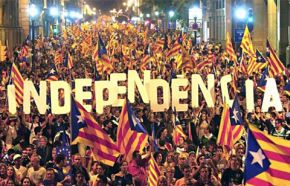Estonia, EU – Baltic States, Legislation, Society
International Internet Magazine. Baltic States news & analytics
Thursday, 25.04.2024, 21:42
Estonian MFA: equal vote distribution must be taken into account in Catalonia
 Print version
Print version |
|---|
"I believe that the region's power forming as a result of these
elections must take into account that the elections results issued a very clear
signal that the crown is quite clearly divided into two when it comes to this
important issue," Mikser told BNS on December 22nd.
"While across parties support has transferred from one to another, one
have gained support and others have lost it, then in reality the ratio between
the power in favor of the unity of Spain and those supportive of the
independence of Catalonia has remained the same. And similarly to the elections
in 2015 -- parties that support Catalonia's independence have received slightly
less than half of the votes and slightly more than half of the seats in
parliament. So, in this sense these elections have not brought a clear
solution," Mikser said.
"However, it has become clear - also in Estonia - that if by
evaluation on the basis of the referendum deemed illegal by the Supreme Court
of Spain it seemed like supporters of independence have a clear advantage in
Catalan society, then as a result of these elections it is clear that the
weighing vessels are very equal," the minister said.
He expressed hope that after the elections a dialogue will be struck up
between the central government and Catalonia, which will ease tensions.
"Hopefully - as these elections have been launched by the Spanish
central government to solve the crisis -- a dialogue will follow, which will
help ease tensions in the Spanish society, including
Catalonia," Mikser said. "It is true that there has been no
great clarification yet, but we must also definitely wait for coalition talks
to occur and agreements to be made regarding the executive power, first and
foremost the position of the region's president, and after this the
distribution of other institutions and possible standpoints of the
program," Mikser said.
Commenting on how Estonia should react to the elections in Catalonia,
Mikser emphasized that it is first and foremost Spain's domestic issue.
"First and foremost, this is naturally Spain's internal affairs, which
they need to solve in accordance with the laws of their own country, the
Constitution of Spain. But of course also in a way as to reduce the tensions
that have piled up," Mikser said. "This is actually not for us
to say, in what way the autonomy will be expanded or not. This is to be agreed
democratically by the central government and regional powers in the framework
of the Constitution of Spain," the foreign minister said.
According to initial election results, three parties in favor of
independence will receive 70 seats in the Catalan 135-seat parliament. Parties
in favor of independence received 72 seats at the previous elections in 2015.
More than 80% of the population eligible to vote took part in the
elections.








 «The Baltic Course» Is Sold and Stays in Business!
«The Baltic Course» Is Sold and Stays in Business!

